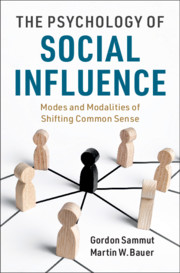Book contents
- The Psychology of Social Influence
- The Psychology of Social Influence
- Copyright page
- Dedication
- Contents
- Figures
- Tables
- Boxes
- Foreword 1
- Foreword 2
- Acknowledgements
- Chapter 1 Modalities of Social Influence
- Part I Recurrent Sources of Populism
- Part II Experimental Paradigms
- Part III Necessary Extensions
- Part IV Theoretical Integration
- Chapter 10 Common Sense
- Chapter 11 Epilogue
- References
- Index
Chapter 11 - Epilogue
Theoretical Issues and Challenges
from Part IV - Theoretical Integration
Published online by Cambridge University Press: 19 December 2020
- The Psychology of Social Influence
- The Psychology of Social Influence
- Copyright page
- Dedication
- Contents
- Figures
- Tables
- Boxes
- Foreword 1
- Foreword 2
- Acknowledgements
- Chapter 1 Modalities of Social Influence
- Part I Recurrent Sources of Populism
- Part II Experimental Paradigms
- Part III Necessary Extensions
- Part IV Theoretical Integration
- Chapter 10 Common Sense
- Chapter 11 Epilogue
- References
- Index
Summary
The final chapter of this volume provides several points of further theoretical elaborations, which, important for our overall argument, would have unduly cluttered the various chapters. It starts by considering how challenges to common sense arise from various types of dissent or deviance including children, homecomers, newcomers, strangers, foreigners, robots or aliens. It proceeds to discuss why and how object-relations and 'inter-objectivity' thought, noted by various scholars, have not received sufficient attention in psychological scholarship and certainly not in relation to influence by artefacts. The chapter lays out the theoretical foundations for such a broadening of scope. The chapter then proceeds to discuss the historically curious dominance of dual-process models over single-process alternatives. The excursions conclude by revisiting the debates concerning the authority of science in Milgram's obedience studies in light of a broader understanding of autonomy, tyranny, argumentation, legality and violence.
Keywords
- Type
- Chapter
- Information
- The Psychology of Social InfluenceModes and Modalities of Shifting Common Sense, pp. 243 - 270Publisher: Cambridge University PressPrint publication year: 2021



